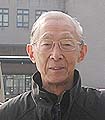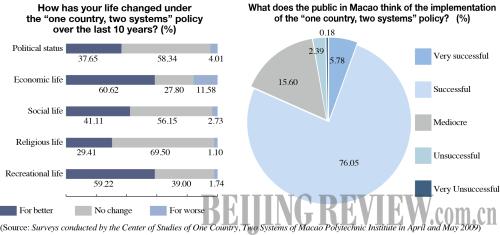|
 |
|
COURTESY OF YANG YUNZHONG | Under the concept of "one country, two systems," first put forward by late Chinese leader Deng Xiaoping to achieve China's reunification, the main part of the country must continue under socialism while a capitalist system has been allowed to exist in certain areas, including Hong Kong and Macao. Ieong Wan Chong, Director of the Center of Studies of One Country, Two Systems at Macao Polytechnic Institute, shares his insights on how this policy has been successfully implemented in Macao over the last 10 years. Edited excerpts follow:
The year 2009 was groundbreaking for the development of the Macao Special Administrative Region (SAR). After electing a new chief executive and legislative assembly, the people of Macao are about to celebrate the 10th anniversary of the area's return to the People's Republic of China on December 20.
As the world slowly walks out of the shadow of the global financial crisis, Macao is one of earliest economies to exhibit signs of recovery, partly due to the robust growth momentum of the economy of the Chinese mainland.
Macao's economy and social indexes over the past 10 years have progressed at unprecedented rates. Macao's population grew from 431,000 in 2000 to 549,200 in 2008, up 27.2 percent. The region's total area grew from 21.45 square km to 29.2 square km over the last decade, an increase of 38 percent. The increased area is valuable land that has been reclaimed from the sea and can be developed for real estate projects.
Macao's gross domestic product (GDP) surged from MOP49.74 billion ($6.22 billion) in 2000 to MOP171.87 billion ($21.48 billion) in 2008, representing an actual growth of 245 percent and an actual average annual growth of more than 15 percent. Macao's per-capita GDP grew from MOP113,793 ($14,171) in 1999 to MOP313,091 ($39,036) in 2008, second in Asia to only Japan and 15th in the world.
Over the past 10 years, Macao's score on the Human Development Index, which combines the four metrics of life expectancy at birth, knowledge, education and standard of living, spiked to 0.943 in 2006.
These achievements have laid a solid foundation for Macao's long-term future development.
Politically, Macao has entered a new stage of development since its return to China in 1999. Macao's political system over the past decade has fundamentally changed from a Portuguese colonial administration to the administrative principles of "one country, two systems," "Macao people governing Macao" and a high degree of autonomy. While property rights have been fully respected, Macao's legal and administrative systems as well as residents' lifestyle have all been altered.
After the changeover, Macao has kept all its original advantages while gaining new ones from the policy of "one country, two systems." Without the support of the Central Government, Macao would not have achieved such outstanding economic growth.
"One country, two systems"—a basic national policy—is also a modern adaptation of the old Chinese wisdom of seeking common ground while putting aside differences. Macao has proven itself a successful model of implementing this policy.

| 